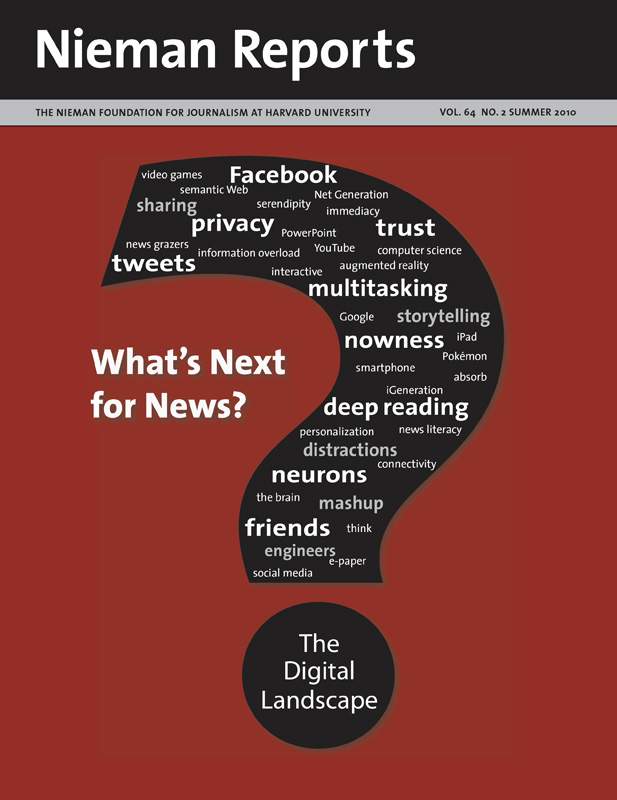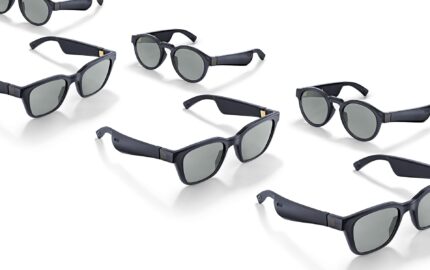RELATED ARTICLES
"Journalism: English for the 21st Century"
- Esther Wojcicki
"The Future of News: What Ninth-Grade Students Think"In February I happened across Josh Quittner’s story “The Future of Reading” in Fortune magazine and thought students in my high school journalism and English classes would enjoy it since they are concerned about the future of journalism. I sensed that his article would be controversial—given his perspective that reading tablets are likely to revive print journalism’s content—but I didn’t anticipate the heated debates we would have about the impact of these emerging digital platforms or the intensity of our discussions about the future of e-textbooks, journalism, and reading in general.
Students hold strong and passionate opinions about e-textbooks. While a majority dislikes e-textbooks, about 20 percent believe that they are the future—and should be.
Perhaps I should have predicted such a reaction given that early in the school year many of these students had written a fiery editorial about e-textbooks in their social studies classes. In part it read, “… online textbooks hinder study habits and force the use of computers. … and are detrimental to learning and inconvenient.” The editorial concluded with these words: “If the school wishes to cultivate the use of e-books, it should at the very least offer students the option to continue using the old, hardcover books.”
I thought things had calmed down in the intervening six months as the students had become accustomed to using e-textbooks. Soon we discovered that was not the case. Several students said that the only reason they would want an e-textbook was if it has “added value, like videos or interactivity.” “We learn better from real textbooks,” most of them said. E-textbooks might work better for math and science, some said, because it appears those e-textbooks are likely to be interactive.
At one point, we did a straw poll with the option of a free Kindle with all their books loaded on it or their old textbooks. The result: 100 percent voted for their heavy, old textbooks.
This overwhelming show of support for print on paper shocked me.
Students were adamant that it was “much easier to learn” from a textbook. (Several students did say that they don’t like carrying heavy books.) With hardcover books, they told me, they can highlight sections and flip through and scan pages more easily; reviewing the highlighted pages helps them remember facts. Portability also was an important factor: With a textbook they could study in random places like at after-school games or practices or they could take it with them to a friend’s house, and no one would ever want to steal it, unlike a Kindle. They said that digital devices in general were hard on the eyes, hard to read outdoors, required dealing with a battery, and are fragile.
Meet the Skeptics: Teenagers
I grew concerned that the students were classifying all reading material into the same category so I decided to break our discussion into four parts—textbooks, news, magazines, novels. This helped to clarify the issues and calmed the conversation. Here’s their view of the other categories:
Our discussions began before the iPad was released, and few students could afford to buy one once they went on sale. Some had gone to the Apple store to try it out and liked it but still did not feel compelled to buy one. Their general consensus was “It looks cool, but I don’t know what I would use it for. It is too big to put in my pocket and I already have an iPod.”
Even Steve Jobs has indicated that he isn’t sure what consumers are going to use the iPad for, according to Lev Grossman in Time magazine. Those few students interested in buying one said things like they “want to be the first one to have it” or “it looks cool for games.” But none want to read magazines or novels on it or get their textbooks on it. They don’t see it as a “game changer,” as Walt Mossberg wrote in his gushing column in The Wall Street Journal, “Apple iPad Review: Laptop Killer? Pretty Close,” parts of which I read to my students. Kids who had tried it at the store complained about the keyboard, about the fact that the keys are so big someone (like their parents) could see what they are typing, that it did not have Adobe Flash, and that they could not watch their favorite program on Hulu.
These kids do not see it as a replacement for their laptop or netbook but as a separate digital species that was as yet unclassified. Their main complaints are its size (too big) and that it isn’t a phone. They see the iPad as a good device for games and something they would want to give to their grandparents who “need to have big type and like to look at pictures.” They also think it would be a good device for their younger siblings since the screen is so big and they could access picture books.
As I listened, I wondered why they are so reluctant to progress. Do they really find it easier to learn from a textbook and more pleasant to read a novel they can hold in their hands? Only time will tell.
I asked my son-in-law, Gregor Schauer, an Internet analyst, for his thoughts on what I am hearing. “They are just wrong. … just plain wrong. They don’t know because they can’t even conceptualize what is coming,” he said. In the long term he might be right, but so far the teens in my classes don’t even want to conceptualize. They are happy with their iPod, especially with its latest features.
Clearly the iPad arouses conflicting opinions, as New York Times technology columnist David Pogue observed when he wrote that “[in] 10 years of reviewing tech products … I’ve never seen a product as polarizing as Apple’s iPad.” Pogue classified people into two groups: the haters, who tend to be techies, and the fans, who tend to be regular people. We can now add one more group: the skeptics, otherwise known as teenagers.
"Journalism: English for the 21st Century"
- Esther Wojcicki
"The Future of News: What Ninth-Grade Students Think"In February I happened across Josh Quittner’s story “The Future of Reading” in Fortune magazine and thought students in my high school journalism and English classes would enjoy it since they are concerned about the future of journalism. I sensed that his article would be controversial—given his perspective that reading tablets are likely to revive print journalism’s content—but I didn’t anticipate the heated debates we would have about the impact of these emerging digital platforms or the intensity of our discussions about the future of e-textbooks, journalism, and reading in general.
Students hold strong and passionate opinions about e-textbooks. While a majority dislikes e-textbooks, about 20 percent believe that they are the future—and should be.
Perhaps I should have predicted such a reaction given that early in the school year many of these students had written a fiery editorial about e-textbooks in their social studies classes. In part it read, “… online textbooks hinder study habits and force the use of computers. … and are detrimental to learning and inconvenient.” The editorial concluded with these words: “If the school wishes to cultivate the use of e-books, it should at the very least offer students the option to continue using the old, hardcover books.”
I thought things had calmed down in the intervening six months as the students had become accustomed to using e-textbooks. Soon we discovered that was not the case. Several students said that the only reason they would want an e-textbook was if it has “added value, like videos or interactivity.” “We learn better from real textbooks,” most of them said. E-textbooks might work better for math and science, some said, because it appears those e-textbooks are likely to be interactive.
At one point, we did a straw poll with the option of a free Kindle with all their books loaded on it or their old textbooks. The result: 100 percent voted for their heavy, old textbooks.
This overwhelming show of support for print on paper shocked me.
Students were adamant that it was “much easier to learn” from a textbook. (Several students did say that they don’t like carrying heavy books.) With hardcover books, they told me, they can highlight sections and flip through and scan pages more easily; reviewing the highlighted pages helps them remember facts. Portability also was an important factor: With a textbook they could study in random places like at after-school games or practices or they could take it with them to a friend’s house, and no one would ever want to steal it, unlike a Kindle. They said that digital devices in general were hard on the eyes, hard to read outdoors, required dealing with a battery, and are fragile.
Meet the Skeptics: Teenagers
I grew concerned that the students were classifying all reading material into the same category so I decided to break our discussion into four parts—textbooks, news, magazines, novels. This helped to clarify the issues and calmed the conversation. Here’s their view of the other categories:
- News: My students overwhelmingly preferred the Internet. They want the story fast and short but they preferred to lounge about and read the newspaper on the weekends. They like to relax with the paper just as their parents do so they wanted both options. Kids claimed they read a greater variety of articles in newspapers; online, they read just what they target.
- Magazines: Timeliness was not an issue. “Who would want to snuggle up with a laptop on the beach or in bed to read a 2,000-word article?” they asked rhetorically. The answer among them was no one. They all liked the feel of paper and being able to flip through the magazine. They felt that magazines are a leisure activity and they like reading them in hard copy.
- Novels: Opinion was split on novels. Some kids thought they wouldn’t mind using a Kindle; others said no. They said if they needed to mark up the book for school they would rather have a book.
Our discussions began before the iPad was released, and few students could afford to buy one once they went on sale. Some had gone to the Apple store to try it out and liked it but still did not feel compelled to buy one. Their general consensus was “It looks cool, but I don’t know what I would use it for. It is too big to put in my pocket and I already have an iPod.”
Even Steve Jobs has indicated that he isn’t sure what consumers are going to use the iPad for, according to Lev Grossman in Time magazine. Those few students interested in buying one said things like they “want to be the first one to have it” or “it looks cool for games.” But none want to read magazines or novels on it or get their textbooks on it. They don’t see it as a “game changer,” as Walt Mossberg wrote in his gushing column in The Wall Street Journal, “Apple iPad Review: Laptop Killer? Pretty Close,” parts of which I read to my students. Kids who had tried it at the store complained about the keyboard, about the fact that the keys are so big someone (like their parents) could see what they are typing, that it did not have Adobe Flash, and that they could not watch their favorite program on Hulu.
These kids do not see it as a replacement for their laptop or netbook but as a separate digital species that was as yet unclassified. Their main complaints are its size (too big) and that it isn’t a phone. They see the iPad as a good device for games and something they would want to give to their grandparents who “need to have big type and like to look at pictures.” They also think it would be a good device for their younger siblings since the screen is so big and they could access picture books.
As I listened, I wondered why they are so reluctant to progress. Do they really find it easier to learn from a textbook and more pleasant to read a novel they can hold in their hands? Only time will tell.
I asked my son-in-law, Gregor Schauer, an Internet analyst, for his thoughts on what I am hearing. “They are just wrong. … just plain wrong. They don’t know because they can’t even conceptualize what is coming,” he said. In the long term he might be right, but so far the teens in my classes don’t even want to conceptualize. They are happy with their iPod, especially with its latest features.
Clearly the iPad arouses conflicting opinions, as New York Times technology columnist David Pogue observed when he wrote that “[in] 10 years of reviewing tech products … I’ve never seen a product as polarizing as Apple’s iPad.” Pogue classified people into two groups: the haters, who tend to be techies, and the fans, who tend to be regular people. We can now add one more group: the skeptics, otherwise known as teenagers.



